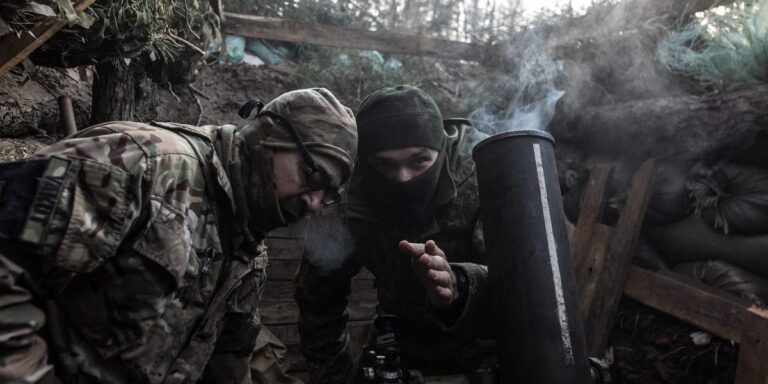- Ukrainian soldiers are forced to put aside their grief on the battlefield, says psychiatrist Yulia Brockdorf.
- Brockdorf visited Ukraine to provide counseling and assistance. The war continued and took a toll on the soldiers’ mental health.
- Long service, PTSD, and lack of consistent help exacerbate soldiers’ mental health problems.
Ukrainian soldiers who have long fought on the front lines, facing the horrors of battle, are forced to put aside their grief on the battlefield, says visiting psychiatrist Yulia Brockdorf.
“It just goes on and on, these losses, these injuries, this unbearable pain,” Brockdorf told Business Insider.
Healthy emotional processing and grief are pushed aside for the mission at hand, defending the country from a relentless enemy. “You need to put that aside because you need to focus and do your job because if you don’t do your job, you’re going to suffer more losses,” he said, describing how many Ukrainian soldiers he has worked with view their situation.
Brockdorf has made several visits to Ukraine since Russia launched its full-scale invasion in February 2022 to provide counseling and medical equipment to soldiers, as he is also a co-founder of DAWN, a nonprofit that has supported Ukraine. His last visit was in March of this year.
“We just go and do what we do”
Often, Brockdorf encountered a seemingly insensitive attitude toward death among soldiers defending Ukraine. “Often, it all boiled down to ‘this is war, it happens,'” he said.
If grief isn’t dealt with immediately, it builds up and becomes harder to deal with later, Brockdorf said. Some soldiers can come out of war without the trauma of witnessing defeat, but others may develop post-traumatic stress disorder, which can vary in severity.
A foreign volunteer who helped defend Ukraine, speaking from his own experience, said that losses in this war, the largest land war in Europe since World War II and a truly devastating human tragedy in terms of combat losses, were inevitable and difficult to process when they happened.
“You lose people almost every week, not necessarily from your company, but also from neighboring companies, people you know,” they told Business Insider. “In the grand scheme of things, our optempo, I guess, is pretty high, so you don’t have time to mourn people, so we just go and do what we do.”
‘There’s a lot of anger inside me’
Dr. Vladislav Matrenitsky, a Kyiv-based psychotherapist, author, and founder of the Expio Center for Psychotherapy, Psychosomatics, and Psychedelic Medicine, has worked with Ukrainian veterans and observed that some patients with PTSD have expressed behaviors such as hypervigilance, agitation, and anxiety.
Many soldiers must deal with the trauma of war only after they return home to their families, but this can be detrimental to their relationships if PTSD sets in and symptoms appear. This issue has long plagued soldiers returning from war.
“The problem is that not many of them understand why this is happening, but they think, ‘It’s okay, it’s just stress, and I’ll be fine with time and rest,'” Matrenitsky explained. “One of them told me, ‘I have so much anger inside me that at night I go out into the city to find someone to fight with.'”
For others, it was not anger, but terror. Some soldiers reported nightmares and panic attacks. One soldier previously told The Washington Post he had a nightmare about his tank commander being burned alive while another dreamed of stepping on another mine and losing another leg.
In addition to the rising number of casualties on the battlefield, Brockdorf added that the lack of consistent aid being delivered to Ukraine is also having an impact on the mental health of soldiers. “Access to supplies, medical supplies, weapons, has a direct impact on suffering, experience, and confidence and feeling supported,” he said.
Despite the trauma of war, troops continued to serve on the front lines and often did not share the burden.
Some Ukrainian soldiers have been serving on the front lines for long periods as Ukraine grapples with a manpower shortage. Brockdorf said the long stints can also exacerbate feelings of fatigue and abandonment among soldiers.
As Mark Hertling, a former US Army general, noted earlier this year in a discussion with CNN, surviving a war for two and a half years “requires an incredible toll on fatigue, psychological damage, and the toughness of being in the front-line trenches is really going to be a morale factor.”
And, indeed, the damage could be long-lasting, which is why Brockdorf said it was important to be there for the Ukrainian soldiers.
“I think it’s very important for the defenders of Ukraine to know: that they are not forgotten,” Brockdorf said. “When you live long enough and you only see bullets, drones and dirt in the trenches, it’s hard to know that someone out there actually remembers and actually fought for you.”
Ryan Pickrell contributed to this reporting.


